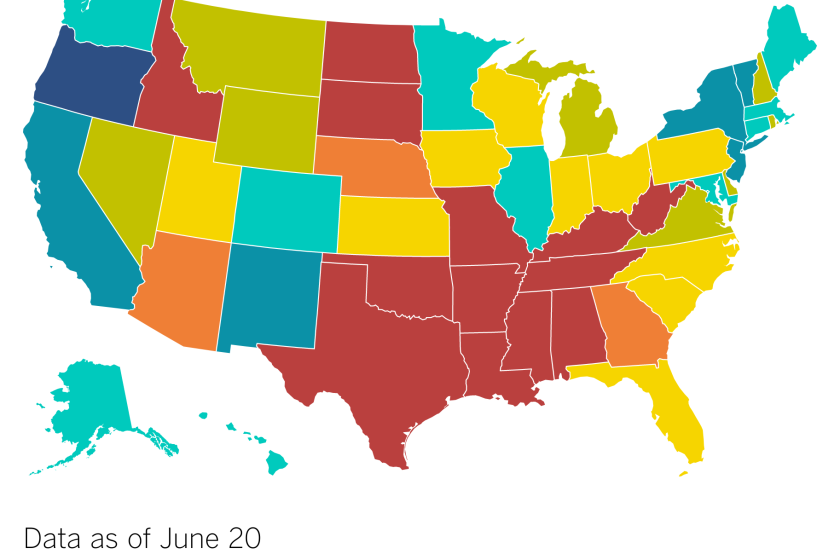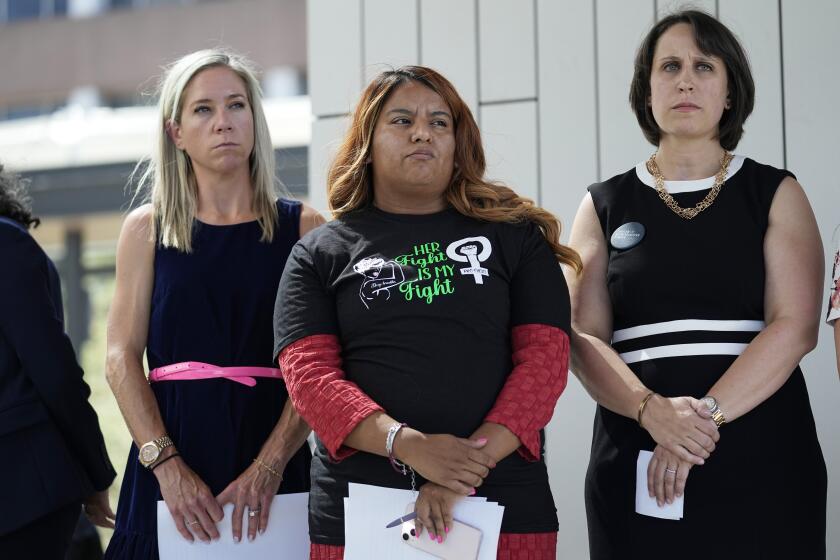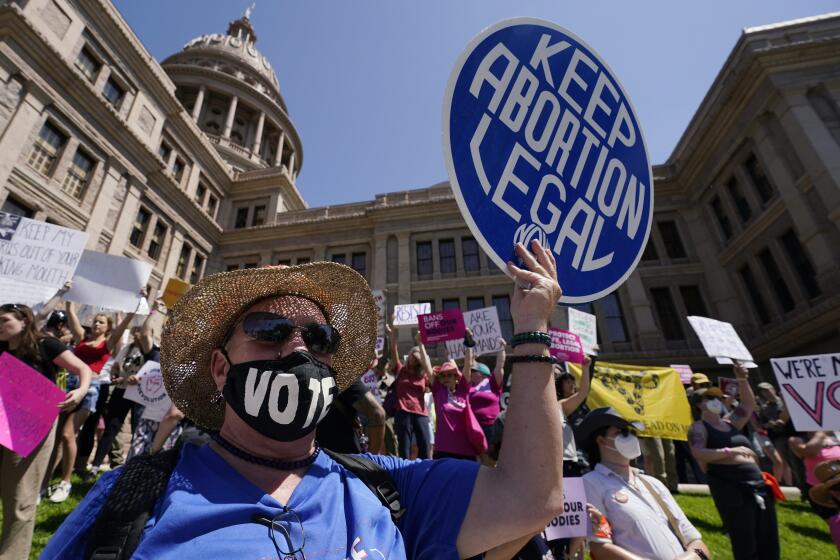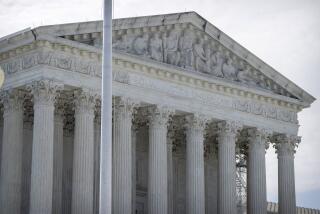Texas judge grants pregnant woman permission to get an abortion despite state’s ban
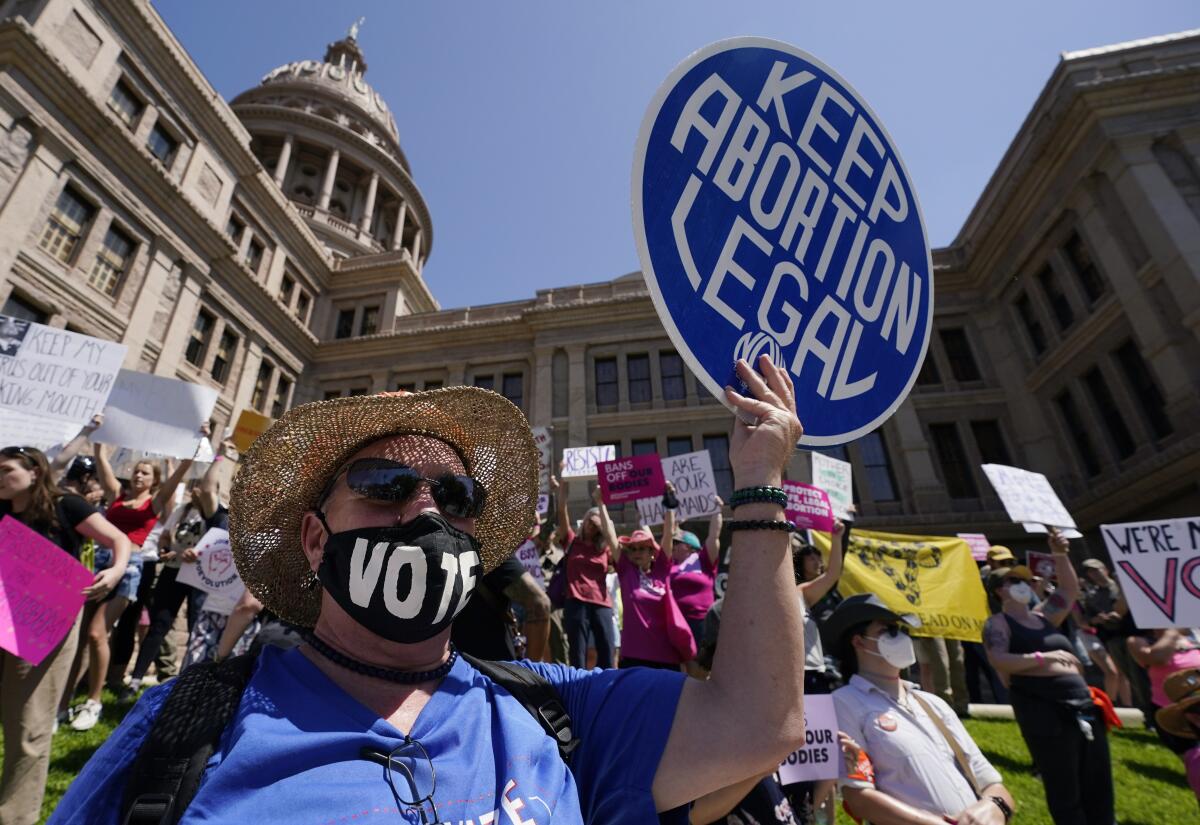
- Share via
AUSTIN, Texas — A Texas judge Thursday granted a pregnant woman whose fetus has a fatal diagnosis permission to obtain an abortion — an unprecedented challenge over bans enacted in more than a dozen states since Roe vs. Wade was overturned.
The lawsuit by Kate Cox, a 31-year-old mother of two from the Dallas area, is believed to be the first time since the landmark U.S. Supreme Court decision last year that a woman anywhere in the country has asked a court to approve an immediate abortion.
It was unclear how soon Cox might receive an abortion. State District Judge Maya Guerra Gamble, a Democrat, said she would grant a temporary restraining order that would allow Cox to have an abortion under narrow exceptions to Texas’ ban. That decision is likely to be appealed by the state, which argued that Cox does not meet the criteria for a medical exception.
A year after the Supreme Court overturned Roe vs. Wade, leaving abortion decisions to states, where is abortion banned or protected? What comes next?
In a brief hearing Thursday, her attorneys told Gamble that Cox went to an emergency room this week for the fourth time in her 20-week pregnancy. Cox and her husband joined the hearing via Zoom but did not address the court.
Doctors have told Cox that if her fetus’ heartbeat stops, inducing labor would carry a risk of a uterine rupture due to her previous cesarean sections, and that another C-section at full term could make her unable to carry another pregnancy through a full term.
Gamble said that the law “might actually cause her to lose that ability is shocking and would be a genuine miscarriage of justice.”
The Center for Reproductive Rights, which is representing Cox, has said this lawsuit is believed to be the first of its kind since Roe vs. Wade was overturned. Since that ruling, Texas and 12 other states rushed to ban abortion at nearly all stages of pregnancy. Opponents have sought to weaken those bans, including with an ongoing challenge in Texas over whether its law is too restrictive for those with pregnancy complications.
An abortion provider accuses Beverly Hills of colluding with antiabortion activists and pressuring a landlord to block an all-trimester clinic’s opening.
“I do not want to continue the pain and suffering that has plagued this pregnancy or continue to put my body or my mental health through the risks of continuing this pregnancy,” Cox wrote in an op-ed published in the Dallas Morning News. “I do not want my baby to arrive in this world only to watch her suffer.”
Although Texas allows exceptions under the ban, doctors and women have argued that the requirements are so vaguely worded that physicians won’t risk providing abortions, lest they face criminal charges or lawsuits.
State officials had asked Gamble to deny the request, alleging that Cox does not meet the requirements for an exception to the ban.
A Texas judge says the state’s abortion ban has proved too restrictive for women with pregnancy complications and must allow exceptions without the risk of doctors facing criminal charges.
“There are no facts pled which demonstrate that Ms. Cox is at any more of a risk, let alone life-threatening, than the countless women who give birth every day with similar medical histories,” the state wrote.
Cox has been told by doctors that she will probably have a stillbirth or a baby that lives for a week at most, according to her lawsuit, which also says doctors have told her their “hands are tied” under Texas’ ban.
The suit was filed a week after Texas’ Supreme Court heard arguments over whether the ban is too restrictive for those with pregnancy complications. That case is among the biggest ongoing challenges to abortion bans in the U.S., although a ruling from the all-Republican court may not come for months.
Five women who said they were denied abortions even when pregnancy endangered their lives are suing Texas over its abortion ban.
Cox had C-sections with her previous pregnancies. She learned in August that she was pregnant for a third time, and was told weeks later that her fetus was at high risk for a condition known as trisomy 18, which results in a high likelihood of miscarriage or stillbirth and low survival rates, according to the lawsuit.
In July, several women in Texas testified about carrying fetuses they knew would not survive and doctors who would not give them abortions despite their spiraling conditions. A judge ruled the ban was too restrictive, but the state has appealed.
More than 40 women have received abortions in Texas since the ban took effect, according to state data, and to date none have faced criminal charges. More than 16,000 abortions were done in Texas in the five months before last year’s ban.
More to Read
Sign up for Essential California
The most important California stories and recommendations in your inbox every morning.
You may occasionally receive promotional content from the Los Angeles Times.
